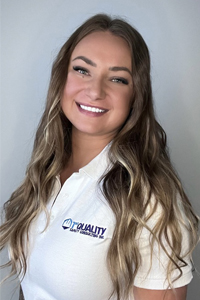When did you decide you wanted a career in occupational health and safety?
After being hired for my second safety job as an HSE Advisor, I decided I wanted to pursue health and safety as a career. I thoroughly enjoyed the balance between field and administrative work while helping the organization improve the safety program by being the problem solver for health and safety. I learned a lot about OHS in this position which really kickstarted my career and gave me the sense of direction I needed to work towards becoming a CRSP.
What was your first occupational health and safety position?
Confined space entry attendant for HSE Integrated at Suncor Refinery.
Tell me about your current job. What are your main areas of responsibility?
I am the founder & Lead COR Auditor of 1st Quality Safety Consulting Inc. In addition to leading my team of safety consultants, I develop and help manage various client’s safety programs as well as conduct external COR audits for the ACSA (Alberta Construction Safety Association).
What do you love about your job? What's the best part of your day?
I love being able to provide professional health and safety insight to my clients and help make a difference to improve their safety programs. The networking opportunities my job provides allows me to meet many great individuals and experience many different scopes of work. The best part of my day is sharing client & worker safety successes during meetings with the stakeholders or submitting a COR/SECOR TLC application along with a client’s brand-new safety program.
What are the challenges you experience in your job?
Since I consistently work with multiple clients at any given time, a challenge I am faced with is ensuring I keep myself informed and prepared for what is required of each specific safety program. For instance, I need to be sure all clients meet their safety program operational document frequency which varies from client to client. As well as always be available for any health and safety-related tasks or advice that a client may request. Most tasks need to be completed in a timely manner, so I must always be prepared and available as their consultant and be able to adapt to the inconsistency between tasks.
What skills are important for success in the OHS field?
One of the most important skills for success in the OHS field is to be proficient at developing relationships with all levels of the organization. On a daily basis, you will be working with everyone from workers to the CEO and need to know how to implement the safety program so that it is understood by each level, as well as being personable because the best compliance comes with trust. I have not let being a young female in the industry set me back. If anything, I embrace it to coach safety to others with a millennial and realistic approach.
What tips do you have for new grads or those in entry level OHS positions who want to move up the ladder?
Focus on the journey, not the finish line. I got my foot in the door with OHS as a confined space watch, and 8 years later I am running my own health and safety consulting business as a CRSP. You have to start somewhere. As long as you are consistently educating yourself, gaining experience and pursuing the best opportunities, your career will flourish. Learn from your failures by putting a different game plan in place and executing it to continue striving to achieve your goals.
The OHS field has been evolving. What changes excite you most?
I am excited that the industry is continuing to incorporate digital means of safety management. This allows me to manage more effectively all my client’s health and safety programs simultaneously, as well as make health and safety tasks less monotonous. I remember spending countless hours at one job printing out safety binders for the entire fleet of vehicles, and now we can have our entire safety program on a mobile app available at our fingertips, providing us with a technological and environmentally friendly approach.
What’s the future of the OHS profession?
The industry will always need OHS professionals. Even if autonomous operations such as vehicles and robots eventually take over human intervention, this is a hazard control that falls within our commonly used hierarchy of controls. Therefore, the organization will still need to engage a health and safety professional to properly design and implement this control measure and investigate incidents for the purpose of developing corrective actions to prevent reoccurrence.
What do you do when you are not working?
When I am not working you can find me training at the gym, singing lessons/karaoke or travelling to warm destinations and completing activities on the water such as scuba diving, surfing or SUP.

